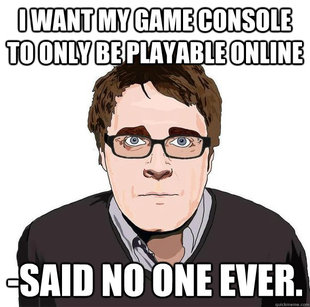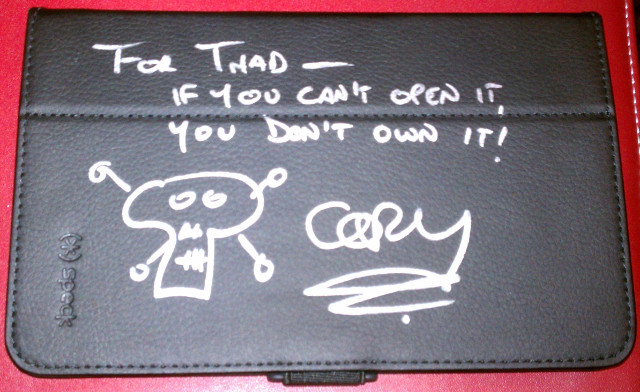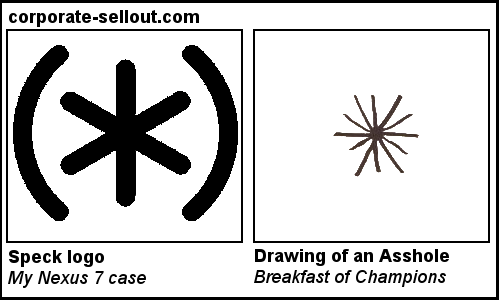Console Zombie's Wii Repair Guides are really quite good. However, after having rooted around in them a bit, I can make a few additions and corrections:
- In addition to the listed tools, I found that I needed the following:
- Razor blade -- many of the screws are covered by little stickers. I couldn't remove them with my fingers; I needed a razor blade to peel them off.
- Tweezers -- and in some cases, I couldn't get them all the way off with the razor blade and needed to grab the corner with a pair of tweezers to pull it the rest of the way off.
- Chip extractor -- I used this to remove the plug that connects the faceplate to the board. It was too tight to do with my fingers.
- And speaking of the faceplate, the instructions on the Wii Case Opening Tutorial are slightly out of order. You can't remove the faceplate before removing the screws on the lefthand side; the front screw on the left side holds the faceplate on.
- The Wii Optical Drive Troubleshooting Guide says that if you don't see a red light when you power on your Wii, it likely means the laser is bad. That may be true, but in my case it wasn't -- test the spindle motor before you go ordering a replacement laser.
Yes, I needlessly ordered a replacement laser only to find, after taking apart and reassembling my Wii, that it worked once and then went back to exactly the same behavior as before.
Now, I'll give this 50/50 on blaming the guide and myself. Because I was blaming the spin motor in the first place and didn't think it was the laser until I read that guide and it said that if you can't see a red light, you've got a bad laser.
But, there was some real foolishness on my part in not thinking to test the motor myself, something I should have thought of even though it's not in the guide: disconnect the power to the spin motor and see if you get the same result.
After I found that my new laser didn't work any better than the old one, I did that, and yes, I get exactly the same symptom with the motor disconnected as I do with it connected. Even if it isn't mentioned in the guide, I should have checked that before I spent $10 for a replacement laser I didn't need. Oh well -- you live and learn. Or sometimes you live and forget the shit you already know and are only reminded after you make a stupid mistake.
A couple more quick notes:
- I ordered an eForcity screwdriver set with a tri-wing and a small phillips, both magnetic. It worked reasonably well for five bucks, but the reviewers are right: these things are flimsy, and in particular the two tri-wing screws on the bottom of the Wii are in there tight. I stripped the head of the tri-wing a bit and I wouldn't expect it to make it through a second round of repairs; it's worth getting if you only plan to use it once, but if you want to buy a tool you can keep and reuse, you're not going to get it for five bucks. Also, the magnet on the phillips is not strong enough to hang onto the larger screws that connect the optical drive to the chassis, which are the hardest screws to put back in.
- Speaking of which: I'm both experienced and careful at repairing electronics, but I broke off lots of little black bits of plastic in working on my Wii. In particular, all four of the pieces that hold the screws where you attach the optical drive just cracked to hell when I screwed it back in. The parts inside the Wii are flimsy as hell and if you're the kind of person who'll be upset if you break something, you really shouldn't be opening up your Wii. Me, I'm a little disappointed -- but if I can get the sucker working again it'll all be worth it. (And if I can't, then fuck it, I'll just attach an external hard drive and rip all my games to that.)
And a final thought: man, moving parts suck.
I look through my collection of old consoles, and the top-loading cartridge ones all still work. SNES, Genesis, N64 -- you're just plugging a board into another board. I have never had an issue with any of those machines.
The NES, well, as you might expect I've had to replace the 72-pin connector. But aside from that single moving part, it's always worked like a champ.
You start getting into optical drives, though?
Well, in fairness, I've never had any trouble with my Dreamcast, GameCube, or the Sega CD I bought on eBay. Or my Xbox 360, though I've only had it for a few months.
But my PS1, PS2, and Wii all quit reading discs after a few years for one reason or another. (Also the second controller slot on my PS2 quit working. I don't know why, and it's not a moving part so it kinda undermines my case that moving parts are the problem. But not my case that They Don't Make 'Em Like They Used To.) And while I haven't personally had any trouble with my new Xbox 360, that console may have the worst reputation for durability of any yet devised.
Hard drives aren't a perfect solution -- after all, hard drives can sure as hell die on you too -- but they're a superior option, especially since console manufacturers have had the good sense to make them easy to insert and remove.
As we move toward SSD's, that's going to make for an interesting set of challenges in and of itself -- I've only been using one in my desktop for a few months and it hasn't failed me yet, but my understanding is that, while they fail less frequently than spinning-platter drives, they fail all at once -- while you can usually recover most of your data from a failing hard drive, if an SSD goes it's gone.
Guess that's an argument for cloud saves. Which, at the rate Nintendo is progressing with its Internet support, should be available sometime around 2048 (but will not allow me to load my own save on my grandchildren's console).
And of course there's a downside to digital delivery as currently implemented: you don't own your game. It's DRM'ed and you can't resell it. For that reason, despite all the bullshit involved in using an optical drive, I still prefer to buy my games on digital media when I can.


